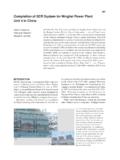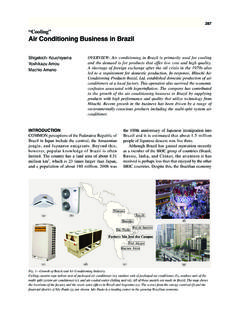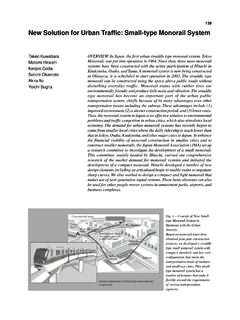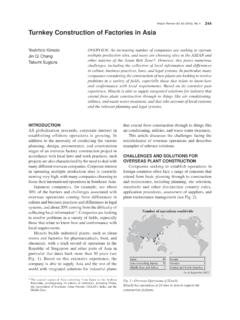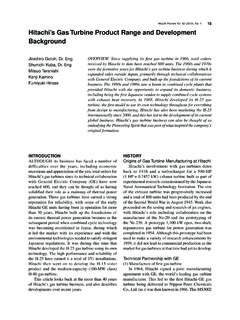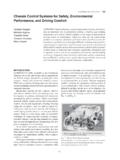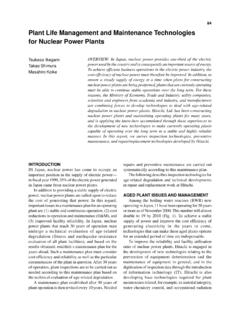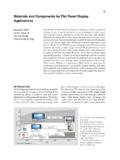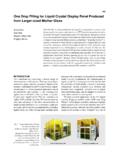Transcription of HITACHI GROUP CSR PROCUREMENT GUIDELINE THE 3rd …
1 HITACHI GROUP CSR PROCUREMENT GUIDELINE THE 3rd edition JANUARY 2017 Value Chain Integration Division HITACHI , Contents Introduction .. 3 HITACHI GROUP Human Rights Policy .. 4 PROCUREMENT Policy .. 6 guidelines for PROCUREMENT Activities .. 7 Framework of CSR Management .. 8 HITACHI GROUP Conflict Minerals PROCUREMENT Policy .. 9 CSR PROCUREMENT GUIDELINE ..10 A. LABOR .. 10 1) Freely Chosen Employment ..10 2) Young Workers ..10 3) Working Hours .. 11 4) Wages and Benefits .. 11 5) Humane Treatment .. 11 6) Non-Discrimination ..12 7) Freedom of Association ..12 B. HEALTH and SAFETY .. 12 1) Occupational Safety ..12 2) Emergency Preparedness ..13 3) Occupational Injury and Illness ..13 4) Industrial Hygiene ..13 5) Physically Demanding Work.
2 13 6) Machine Safeguarding ..14 7) Sanitation, Food, and Housing ..14 8) Health and Safety Communication ..14 C. ENVIRONMENT .. 14 1) Environmental Permits and Reporting ..15 2) Pollution Prevention and Resource Reduction ..15 3) Hazardous Substances ..15 4) Wastewater and Solid Waste ..15 5) Air Emissions ..15 6) Materials Restrictions ..15 7) Storm Water Management ..16 8) Energy Consumption and Greenhouse Gas Emissions ..16 9) Management of Water Usage ..16 2 10) Preservation of Biodiversity and Ecosystems ..16 D. ETHICS .. 17 1) Business Integrity ..17 2) No Improper Advantage ..17 3) Disclosure of Information ..17 4) Intellectual Property ..18 5) Fair Business, Advertising and Competition ..18 6) Protection of Identity and Non-Retaliation ..18 7) Responsible Sourcing of Minerals.
3 18 E. MANAGEMENT SYSTEM .. 18 1) Creation of CSR Policy ..18 2) Appointment and Responsibility of Executive Officers in Charge of the Management Systems ..19 3) Legal and Customer Requirements ..19 4) Risk Assessment and Risk Management ..19 5) Improvement Objectives ..19 6) Training ..19 7) Communication for Workers, Suppliers, and Customers ..20 8) Worker Feedback and Participation ..20 9) Audits and Assessments ..20 10) Corrective Action Process ..20 11) Documentation and Records ..20 12) Supplier Responsibility ..20 F. PRODUCT QUALITY & SAFETY .. 21 1) Ensuring product safety ..21 2) Establishment and apply a quality management system ..21 G. PREVENTION LEAKAGE OF PERSONAL / CONFIDENTIAL INFORMATION .. 21 1) Securing computer networks against threats including cyber attack.
4 21 2) Protection privacy ..22 3) Prevention the leakage of personal information ..22 4) Prevention the leakage of customer and third-party confidential information ..22 . Revision History ..23 This GUIDELINE was created using the contents of " HITACHI GROUP Codes of Conduct" ( ) as a reference, which was set by our company in August 2010 based on the contents of the "Code of Conduct Version " (revised on January 2016) of the EICC (Electronic Industry Citizenship Coalition). 3 Introduction The Corporate Credo of HITACHI GROUP is to contribute to society through the development of superior, original technology and products , and the GROUP conducts its business activities under the GROUP Vision of utilizing innovation to solve fundamental problems of the global society in order to bring about a vibrant world.
5 Under this Vision, HITACHI GROUP has been actively involved in CSR (Corporate Social Responsibility) activities. The HITACHI GROUP PROCUREMENT Department started supply chain management activities in the early 2000s, which HITACHI GROUP further accelerated and promoted following the GROUP s announcement to participate in the United Nations Global Compact (*Note 1) in February 2009. Looking at the world today, many agreements were set within the framework of the United Nations to deal with problems faced by various countries around the world. Examples include the UN Guiding Principles on Business and Human Rights endorsed in June 2011, Sustainable Development Goals (*Note 2) in September 2015, and the Paris Agreement which was adopted at the 21st Conference of the Parties to the United Nations Framework Convention on Climate Change (abbreviated COP21) in December 2015.
6 Companies throughout the world are expected to comply with the details of these agreements and to actively fulfill their roles. In this way, global society now expects companies to fulfill their social responsibilities more so than before, a trend that is expected to accelerate even further in future. Under these circumstances, the HITACHI GROUP believes that actively improving on the supply chain management activities will lead to the mutual prosperity of all suppliers and HITACHI GROUP , and as such has created the 3rd edition of the HITACHI GROUP CSR PROCUREMENT GUIDELINE based on CSR supply chain management methods which have been established as global standards. We would like all our suppliers to carefully read the contents of this GUIDELINE with the abovementioned points in mind, and to receive your support and cooperation in implementing this GUIDELINE .
7 (*Note 1) United Nations Global Compact, abbreviated UNGC: Put forward by then UN Secretary-General Kofi Annan at the 1999 World Economic Forum (Davos meeting) and launched at UN headquarters in New York on July 26, 2000. The UNGC has more than 13,000 signatories (including approx. 8,300 companies) in 160 countries as of July 2015, and operates based on 10 principles in the 4 areas of human rights, labor, environment and anti-corruption. (*Note 2) Sustainable Development Goals, abbreviated SDGs: Adopted in September 2015 at the United Nations General Assembly, the SDGs identify 17 goals that the whole world must work together to achieve by 2030, such as ending poverty and hunger, ensuring inclusive and equitable quality education, decent work, sustainable economic growth, and environmental protection.
8 Strong emphasis is placed on leaving no one behind in the SGDs. January 2017 HITACHI , Ltd. Value Chain Integration Division 4 HITACHI GROUP Human Rights Policy The HITACHI GROUP supports the realization of human rights by contributing to society through the development of superior, original technology and products, and delivering innovations that answer society s challenges. As a prerequisite to this, HITACHI seeks to meet its responsibility to respect human rights. The Responsibility to Respect Human Rights HITACHI strives to meet its responsibility to respect human rights by not infringing on human rights and addressing negative human rights impacts with which the company may be involved through its operations and business relationships.
9 HITACHI understands human rights to be, at a minimum, those outlined in the International Bill of Human Rights and the International Labour Organization s Declaration on Fundamental Principles and Rights at Work. The responsibility to respect applies to all officers and employees of HITACHI , Ltd. and its consolidated subsidiaries. HITACHI expects its business partners and other parties whose own impacts may be directly linked to HITACHI s operations, products or services to respect and not infringe upon human rights, and will respond appropriately where they are not respecting human rights. Relationship to HITACHI s Values and Policies HITACHI is aware that as a business enterprise it is a member of society and can contribute to creating an environment in which human rights are respected.
10 Meeting the responsibility to respect human rights is key to operating as a responsible business, and is accepted to be a baseline expectation for all companies. It is an expression of HITACHI GROUP s Mission and Vision. This policy supplements the HITACHI GROUP Codes of Conduct and CSR policy. Implementing the Responsibility to Respect Human Rights HITACHI is committed to meeting the responsibility to respect human rights through implementing the UN Guiding Principles on Business and Human Rights. HITACHI will develop and implement on going human rights due diligence. Due diligence processes will include identifying and assessing potential and actual human rights impacts, and taking appropriate action to prevent or mitigate risks. The processes will also entail tracking to ensure the effectiveness of HITACHI s actions to address impacts and risks.
